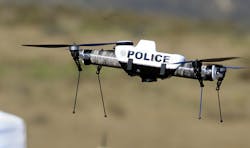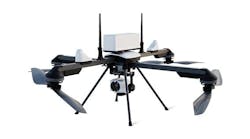WASHINGTON -- Police departments across the country have bought inexpensive small drone aircraft with cameras to help track drug dealers, find missing children and locate wandering Alzheimer's patients, but federal rules designed to protect the nation's airspace have kept them grounded.
That is about to change in a dramatic way.
Under a law President Obama signed in February, the Federal Aviation Administration must write rules by May 14 on how it will license police, fire department and other public safety agencies eager to fly lightweight drones at low altitudes.
The FAA also is supposed to develop plans by this year to integrate drones operated by individuals or corporations into U.S. airspace by 2015.
The bottom line: Thousands of remotely piloted aircraft of various shapes, sizes and speeds -- at least some carrying high-resolution cameras and sophisticated sensors -- may soon be buzzing overhead.
FAA officials have long worried that ground-based pilots of drone aircraft can't always see or avoid commercial and other aircraft. And civil liberties groups warn that Americans could face unprecedented surveillance from above in violation of privacy rights.
But members of Congress, backed by drone manufacturers, inserted language in the FAA reauthorization bill that requires the agency to move swiftly to license drones. The new rules are supposed to help determine who can fly a drone -- and how high and far -- without posing a threat.
Advocates say the unmanned planes could be deployed for uses as diverse as dusting crops, selling real estate, giving real-time traffic reports and helping with disaster relief. Some can stay aloft at a fraction of the cost of helicopters and manned aircraft.
Next month's set of FAA rules will apply only to police and other first-responder drones smaller than 4.4 pounds that are flown in daylight below 400 feet, and that stay within a pilot's line of sight. They resemble large model planes.
"We want [police] to be able to use the aircraft sooner because there is a public interest," said Ben Gielow, government relations manager for the Assn. for Unmanned Vehicle Systems International, an industry organization that helped draft some of the language in the new law.
Critics say the FAA is moving too quickly to secure privacy and safety.
"I think it is a very quick timeline," said Jennifer Lynch, a lawyer with the Electronic Frontier Foundation, a San Francisco-based advocacy group that has sued to compel the FAA to release more information about its plans.
"Rushing to push through applications to fly drones doesn't seem like a good idea," she said.
At least a dozen police departments have asked the FAA for permission to fly drones.
Police in Gadsden, Ala., used a $150,000 federal grant two years ago to buy a lightweight drone called a WASP III to help in drug investigations. But officers have yet to fly the drone, said Capt. Regina May, a department spokeswoman.
"We're going to be keeping an eye on what happens" on May 14, she said.
Copyright 2012 - Los Angeles Times


